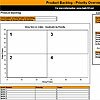All Posts Tagged With: "Agile Project Management"

Agile Testing vs. Traditional Testing
This this is a remarkably capitvating and informative talk that actually had me laughing out loud at times – it gets more serious at the lecture progresses. Elisabeth Hendrickson, founder of Quality Tree Consulting, provides training and consulting in the areas of software quality and testing.
7Aug2009 | taraleewhitaker | 2 comments | Continued
The Product Manager – Role and Responsibilities
The Product Manager represents the Product Owner and the End-User/Customer – they are responsible for defining and scheduling the delivery of high quality output in line with business requirements and priorities.
7Aug2009 | taraleewhitaker | 5 comments | Continued
1min Video Introduction to Agile User Stories
A 1-minute animated introduction to User Stories by Agile Advocate.
5Aug2009 | taraleewhitaker | 0 comments | Continued
Scrum Product Backlog Template (with Priority Overview)
A Product Backlog is a list of top-level requirements that are usually associated with a single Project or Product.
29Jul2009 | taraleewhitaker | 5 comments | Continued
12 Principles of Risk Management (PMBOK – with an Agile slant)
The Project Management Body of Knowledge (“PMBOK”) describes 12 Principles of Risk Management. I’ve taken the headings and summarised the main messages from an Agile perspective…
28Jul2009 | taraleewhitaker | 0 comments | Continued
Agile Risk Management – Identifying Risks (1 of 4)
Risk identification is the first stage in the Agile Risk Management process. This stage is followed by Risk Assessment, Risk Response and Risk Review.
27Jul2009 | taraleewhitaker | 1 comment | Continued
Agile Risk Management – Assessing Risks (2 of 4)
Risk Assessment is the second stage in the Agile Risk Management process. This stage is preceeded by Risk Identification, and followed by Risk Response and Risk Review.
27Jul2009 | taraleewhitaker | 0 comments | Continued
Agile Risk Management – Risk Response (3 of 4)
Risk Response is the third stage in the Agile Risk Management process. This stage is preceeded by Risk Identification and Risk Assessment and followed by Risk Review.
27Jul2009 | taraleewhitaker | 0 comments | Continued
Agile Risk Management – Risk Review (4 of 4)
var dzone_style=”2″;Risk Review is the final stage in the Agile Risk Management process. This stage is preceeded by Risk Identification, Risk Assessment and Risk Response.
A Risk is an uncertain event that will impact your chosen path should it be realised. Risks are events that are not currently affecting you – they haven’t happened yet. Once a [...]

Agile Risk Management – The difference between Risks and Issues
A Risk is an uncertain event that could impact your chosen path should it be realised. Risks are events that are not currently affecting you – they haven’t happened yet. Once a risk is realised, it has the potential to become an Issue.
26Jul2009 | taraleewhitaker | 3 comments | Continued



















